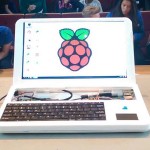
It’s quite clear that 3D printing is becoming a do-it-yourselfer’s dream. The ability to print practically any shape desired out of polymer material, allows for tremendous opportunity when it comes to producing innovative, creative projects. It is when you combine 3D printing with the credit card-sized single-board computer, known as Raspberry Pi, that the ideas can really start to take off.
You may be familiar with other 3D printing/Raspberry Pi projects that we have covered such as that of the Gameboy. Projects like this are extremely informative for those wishing to expand their knowledge of design and electronics.
If you thought the 3D printed Gameboy was cool, then this next project may really impress you. A team of five individuals based in London, England, have collaborated to create what they call the Pi-Top. The Pi-Top is the first 3D printed laptop computer. What they intend to do is provide users with a kit packed full of all the materials needed to construct the device, as well as very detailed instructions on how to create this laptop computer from start to finish. All the user has to do is put it together, and if they choose, 3D print the outer shell. The entire process is intended to be an incredible learning experience, teaching those who are interested, skills which will forever be with them, allowing for the creation of electronics via the Raspberry Pi system.
The team has already printed their first prototype for the Pi-Top project, using a Rostock Max V2 Kit with an E3D metal hotend. The shell of the laptop was printed out of PLA filament over a 160 hour span, with 0.2mm layers and 30% infill. The shell is printed in three separate pieces, two of them at the same time, and the larger piece by itself. The Pi-Top will feature a 6-8 hour battery life, WiFi, a true laptop (not Bluetooth) keyboard, and a 13.3″ TFT LCD panel with an LED backlight for a screen. The Resolution of the screen is 1366×768 and it has a 40 pin LVDS interface. It will run on the Rasbian Operating System, and have a sliding clear panel to allow for easy access to the Raspberry Pi board, without the need for unscrewing.
The plan is to make these kits available via the crowdfunding platform Kickstarter, and raise enough money to allow the group to expand on their idea. If funded, the actual kits will come with an already fabricated shell via injection molding, with the option for users to 3D print their own.
Source: Techcrunch.com